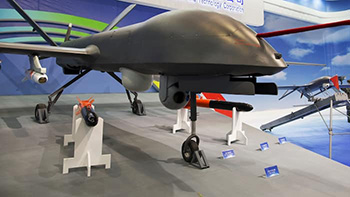
The company behind China’s home-grown range of armed drones is to seek a public listing in a sign of new openness to private capital in the country’s secretive defence industry.
中国一家自主生产武装无人机的公司将寻求公开上市,表明中国神秘的国防工业对民间资本进一步开放。
Nanyang Technology, a little-known and mostly inactive company already listed on the Shenzhen Stock Exchange,
南洋科技(Nanyang Technology)是一家鲜为人知、通常行事低调的公司,本身已在深圳证券交易所上市。
quietly moved last summer to acquire the unit that makes the Caihong (Rainbow) series of drones from the China Aerospace Science and Technology Corporation (CASC), according to two people briefed on the plans.
两位听取过相关计划介绍的人士表示,今年夏天,南洋科技悄然对中国航天科技集团公司(CASC)旗下制造彩虹系列无人机的公司启动了收购。
Once the acquisition is complete, Nanyang will change its name and allow investors to pick up shares in what amounts to a backdoor public offering.
一旦完成了收购,南洋科技将变更该公司名称,允许投资者认购这家借壳上市的公司的股票。
The new name for the drone maker has not yet been publicly announced.
该无人机制造公司的新名称目前尚未对外公布。
In addition to military drones, the unit also makes two types of air-to-ground missiles eagerly sought by Middle Eastern and African buyers.
除了制造军用无人机,该公司还生产两款颇受中东和非洲买家欢迎的空对地导弹。
Many of those governments have been refused military drones by the US, which has raised concerns about how they will be used.
美国拒绝向这些地区许多国家的政府出售军用无人机,主要出于对无人机用途的担忧。
Chinese drones have already appeared in conflicts in Iraq, Yemen and Nigeria.
而中国制造的无人机已经出现在伊拉克、也门以及尼日利亚的冲突中。
The planned listing has already led the company to open itself up to unprecedented public scrutiny.
此次上市计划使该公司史无前例地暴露在公众目光之下。
On Tuesday CASC held the first press conference in its history, inviting Chinese journalists and one western publication to a briefing by its chief engineer and a tour of a training facility.
周二,中国航天科技集团公司举行了公司历史上首次新闻发布会,邀请中国媒体及一家西方新闻机构的记者听取了其首席工程师的情况简报并参观了一处训练设施。
The target market was evident by the computer graphics on the training centre’s computer simulation: a Middle Eastern desert landscape laced with palm groves and a terrorist training camp that trainee pilots learn to bomb.
该训练中心计算机模拟的电脑图像清楚地表明了该公司的目标市场:画面中包括一片点缀着棕榈树的中东沙漠以及一个供受训飞行员学习投弹的恐怖分子训练营。
The bestselling CH-4 drone is remarkably similar in appearance to General Atomics’ MQ-9 Reaper that has been widely used in combat by the US.
卖得最好的彩虹4无人机在外观上神似美国通用原子公司(General Atomics)生产的、美军广泛应用于作战的MQ-9死神(Reaper)无人机。
It’s not a direct copy, but it sure does look familiar, said Peter Singer, an expert on drone warfare at the New America Foundation in Washington.
这不是直接仿造,但看起来的确很眼熟,华盛顿新美国基金会(New America Foundation)无人机作战专家彼得.辛格(Peter Singer)说,
So it’s either pure coincidence, or something else.
所以,要么纯属巧合,要么是什么别的原因。
I’ll take something else.
我相信后者。
CASC declined to detail its export markets, but a spokesman said there were currently 10-20 end users.
中国航天科技集团公司拒绝详细列举其出口市场,但一位发言人称,目前有10到20家终端用户。
CH drones are mainly used against anti-government armed forces, including Isis, the spokesman said.
彩虹无人机主要用于打击反政府武装,包括伊斯兰国(ISIS),上述发言人表示。
Shi Wen, chief engineer of the Caihong drones, added: We mainly sell to poor and middle-income developing countries.
彩虹系列无人机总工程师石文补充说:我们主要卖给较穷和中等收入的发展中国家。
American armed drones are subject to strict export controls by Washington, but China has swooped into the market, selling to Egypt, Nigeria, Saudi Arabia, Pakistan and Iraq.
美国武装无人机受到政府严格的出口管制,而中国已迅速打开国际无人机市场,产品销往埃及、尼日利亚、沙特阿拉伯、巴基斯坦和伊拉克等国。
Several of those were turned down by the US when they asked for export licences.
其中一些国家曾请求美国颁发出口许可证,但遭到了美方拒绝。
China is also believed to have provided technological assistance to Pakistan’s armed drone programme.
中国据信还曾向巴基斯坦的武装无人机项目提供技术支持。
A publicly listed unit is not uncommon in the defence sector in China,
让下属公司上市的情况在中国国防工业并不少见。
where the top 10 state-owned defence groups, including China State Shipbuilding Corporation and Aviation Industry Corporation of China, have listed more than 70 subsidiaries. Most of these are not involved in defence-related businesses,
中国前十大国有防务集团——包括中国船舶重工集团公司(China Shipbuilding Industry Corporation)和中国航空工业集团公司(Aviation Industry Corporation of China)——已经有70多家子公司上市。
however, and even fewer deal with sensitive technologies.
不过这些上市公司大多不涉及与国防有关的业务,涉及敏感技术的就更少了。
Allowing a maker of highly sensitive technology to sell shares to the public appears to indicate a new tolerance for private capital as Beijing seeks to drive expansion of defence exports.
允许一家拥有高度敏感技术的制造商向公众发售股票,似乎表明北京方面在谋求扩大国防出口之际,开始对民间资本抱着更为宽容的态度。
The long-term goal of gradual privatisation appears to be to transform some of China’s leading defence contractors and to emulate the US military industrial complex.
逐步引进民间资本的长期目标似乎是为了推动一些主要国防承包商进行改革,效仿美国军工复合型产业发展中国国防工业。












